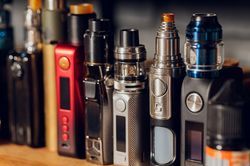BMRA warns the Government of safety concerns when disposing of the devices
The Government is “playing with fire” with its proposed vape swap to stop scheme, a leading trade association has warned.
Under new measures, councils and others are set to offer a million smokers across England a free vaping starter-kit in a bid to drive down cigarette use.
But the British Metals Recycling Association (BMRA) say the scheme poses a fire risk because the current regulations for disposal of both single-use and rechargeable vapes are often not being followed and are leading to an increasing number of blazes.

James Kelly, the CEO of the BMRA, said: “ Vapes are essentially small electronic devices and are subject to regulations when no longer required. However, the reality is that not enough of the public are aware of this and often throw vapes and other electronic items containing lithium-ion batteries in a bin, which, when damaged, are causing fires and can even explode.
“That’s why the BMRA is concerned about this scheme. We believe Ministers are playing with fire with this policy and that an awareness and education campaign is urgently needed.
“We are reiterating our call for lithium-ion batteries, alongside waste electrical and electronic equipment, to be able to be collected in a kerbside collection to ensure ease of disposal for householders.
“We also need to see a system for appropriate, on-the-go disposal of vapes being made available. This will help to protect workers from fires and explosions caused by these batteries and ensure all component parts can be safely and properly recycled.”
With 1.3 million single-use vapes thrown away every week, this scheme could add even more to that number requiring disposal. Lithium-ion batteries, according to Material Focus, cause “three and half times more” fires in the waste stream.
Notes for editors:
For further information, contact [email protected] or [email protected]
ABOUT THE BMRA:
The British Metals Recycling Association (BMRA) represents the £7 billion metals recycling sector, which comprises an estimated 2,000 businesses and employs over 15,000 people. The industry trades and processes over 10 million tonnes of ferrous and non-ferrous metals every year, including: steel, aluminium, and copper. On average, we export eight million tonnes every year: or 80% of all scrap arisings in the UK.
Scrap metals are secondary raw materials whose use reduces the demand for precious natural resources needed to make new metal compounds – such as iron ore in steelmaking; nickel in stainless steel; or alumina and bauxite in aluminium smelting.
For example, every tonne of recycled steel saves:
- 1.5 tonnes of iron ore
- 0.5 tonnes of coal
- 70% of the energy
- 40% of the water
- 75% of CO2 emissions
The figures for aluminium and copper are even more impressive. The recycling of copper requires up to 85% less energy than primary production. Around the world, this saves 40 million tonnes of CO2. Recycling aluminium uses 95% less energy than producing aluminium from raw materials and saves 97% of greenhouse gas emissions produced in the primary production process.
